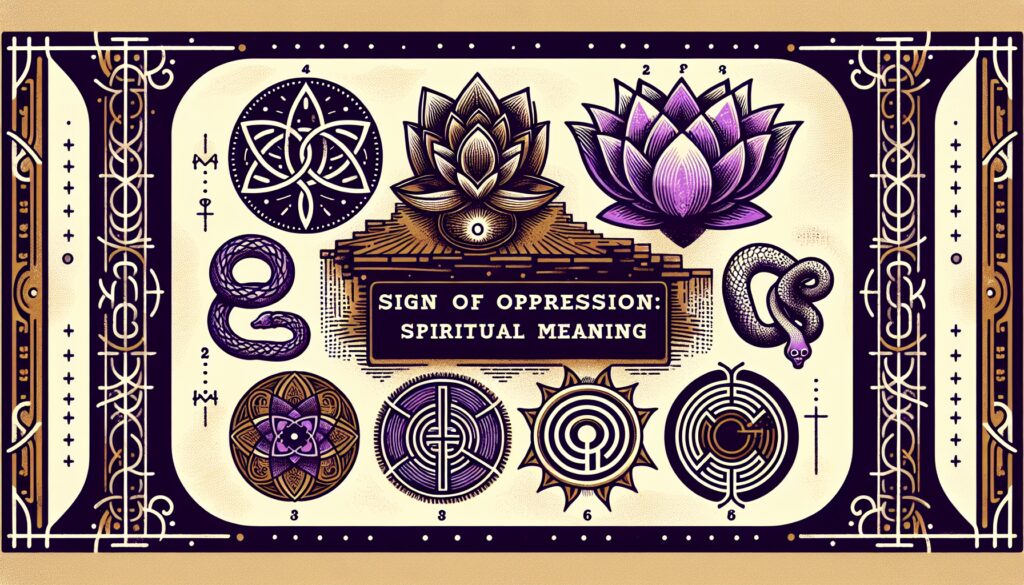Spiritual oppression, a multifaceted phenomenon, has been contemplated through various lenses within the Bahá’í teachings. This elucidation aims to unpack the intricate layers of spiritual oppression by examining its definitions, manifestations, causes, and potential paths to liberation. The aim is to offer a thorough understanding for those seeking deeper insights into the spiritual landscape shaped by Bahá’í principles.
At the heart of the discussion on spiritual oppression lies its definition. Spiritual oppression can be succinctly described as the act of diminishing the inherent spiritual potential of individuals or communities through various oppressive methods, including social, emotional, or institutional pressure. Within the lens of Bahá’í teachings, it is believed that every individual possesses a spark of the divine, and any attempt to suppress that potential constitutes spiritual oppression. This disenfranchisement not only affects individuals but can also extend to entire communities, choking the burgeoning possibilities of collective spiritual advancement.
Bahá’í teachings provide a categorical framework for understanding the different forms of spiritual oppression. Broadly, these can be divided into three primary types: ideological oppression, emotional oppression, and social oppression.
Ideological oppression, the first type, manifests itself through the suppression of diverse beliefs and ideas. In many contexts, dominant ideologies can marginalize alternative perspectives, leading to intellectual stagnation. Bahá’í principles advocate for the freedom of thought and the importance of dialogue in fostering a shared understanding. In contrast, when certain ideologies are enforced at the expense of others, the result is an environment where critical thinking is stifled, creativity is curtailed, and the diversity of thought is eradicated.
The second type, emotional oppression, is inherently personal yet often systemic. An environment steeped in fear, guilt, or shame can severely inhibit one’s spiritual growth. Emotional oppression may arise from oppressive societal norms or familial expectations that compel individuals to deny their true selves or conform to unsustainable ideals. In the context of Bahá’í teachings, emotional oppression directly contradicts the objective of cultivating love and unity. Bahá’u’lláh, the founder of the Bahá’í Faith, emphasizes the significance of compassion and understanding, which are antithetical to the divisive nature of emotional oppression.
Social oppression, the third category, manifests through systemic injustices embedded within societal structures. This form of oppression may arise from discriminatory practices based on race, gender, or economic status, leading to the disenfranchisement of significant segments of the population. Within the Bahá’í framework, social oppression is viewed as a grave injust justice against the principle of the oneness of humanity. The violation of this principle fosters disunity and discord and inhibits the collective spiritual progress that is essential for humanity’s advancement.
Understanding the causes of spiritual oppression is crucial in recognizing the pathways toward liberation. Bahá’í teachings elucidate several key factors that contribute to this pernicious phenomenon. Ignorance, for instance, serves as a fundamental barrier that perpetuates division and the devaluation of others. When individuals lack awareness of universal truths and shared humanity, they are more likely to engage in oppressive behaviors, whether overtly or insidiously.
Control, both exercised by individuals and institutions, also constitutes a significant cause of spiritual oppression. The desire to maintain power can lead to the implementation of oppressive measures that resist change and hinder the flourishing of diverse perspectives. Bahá’í teachings assert that true leadership is predicated on service to humanity, which stands in stark contrast to the domination characteristic of oppressive regimes.
Further, the cultivation of fear can serve as a tool for oppression. When individuals are made to feel unsafe or threatened by expressing their true beliefs or identities, their spiritual growth is stifled. The Bahá’í Faith emphasizes the importance of creating environments where love, trust, and understanding prevail, ensuring that individuals feel secure in their quest for spiritual truth.
The effects of spiritual oppression are profound and multifarious. Individuals subjected to spiritual oppression may experience feelings of alienation, despair, or a disconnection from their intrinsic worth. Communities may become fragmented, suffering from internal divisions that inhibit collective progress. Furthermore, when spiritual oppression is prevalent within society, it can engender systemic injustices that perpetuate cycles of poverty, violence, and disenfranchisement.
However, avenues toward liberation from spiritual oppression are not only possible but integral to the Bahá’í vision for humanity. Education is paramount; it serves as a powerful antidote to ignorance and a means to empower individuals. Through the dissemination of knowledge, individuals can awaken to the importance of unity in diversity and the value of every human being.
Dialogue emerges as another essential pathway toward overcoming spiritual oppression. Engaging in open, honest conversations fosters understanding and breaks down barriers. Bahá’í teachings encourage individuals to explore and share their perspectives, promoting a culture of collaboration that can dismantle oppressive ideologies.
Finally, the cultivation of love and compassion stands as the foundation for addressing the ills of spiritual oppression. By fostering environments that prioritize understanding and empathy, individuals can transcend their grievances and work collaboratively towards healing. This love is not merely an emotion but an active principle that seeks to uplift and empower all individuals.
In conclusion, understanding spiritual oppression through the lens of Bahá’í teachings provides a comprehensive framework for addressing its complexities. By recognizing its forms, causes, and effects, as well as the paths to liberation, individuals and communities can embark on a collective journey toward spiritual enlightenment, fostering a more harmonious and united existence for all. Such an endeavor is not only spiritually enriching but also vital for the realization of a just and equitable society.
